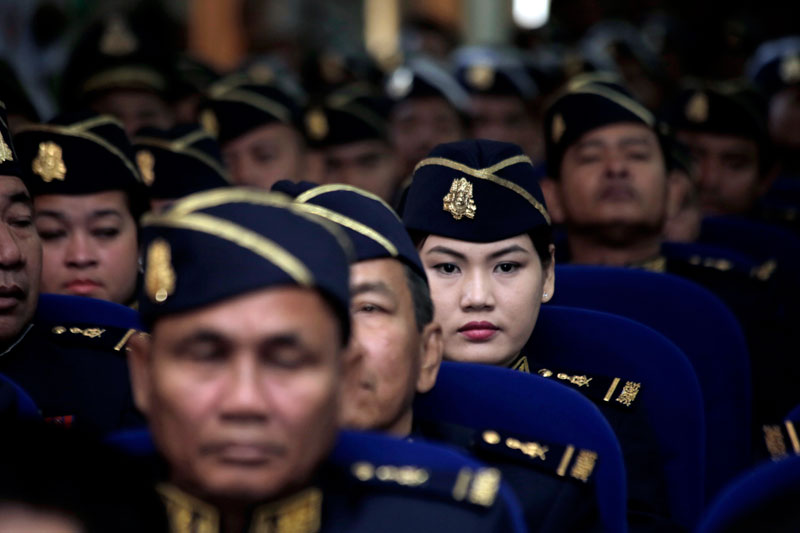The country’s police force added 1,207 new officers Friday with a cadet graduation at the Police Academy of Cambodia in Kandal province. Presiding over the ceremony in Kien Svay district, Interior Minister Sar Kheng asked the female officers in the class to stand up.
There were 65 of them.

In the country’s entire police force, which numbers more than 58,000 officers, the representation of women is about 5 percent, in line with Friday’s graduating class, according to National Police spokesman Kirth Chantharith.
Mr. Kheng told the graduates on Friday that he would work to make sure things did not stay that way.
“I will review this problem again because this amount is not enough,” he said, noting that some 2,000 police officers retired in 2014 and needed to be replaced.
“We want at least 30 to 40 percent [of the replacement officers to be women],” he said. “We will train them to have any skills—immigration police need them, traffic police also need policewomen and penal police need them because they have to inspect women.”
Mr. Kheng said that female police officers would be particularly useful in the ranks of traffic police, as they are generally less abrasive than their male colleagues.
“If there are many women working in the traffic police, it can reduce traffic accidents and also help remind people who are driving to respect the law, because women do not have problems with men, and the same with women,” he said.
Lieutenant General Chantharith said police have tried various methods of attracting women into the force, but to little avail.
“There are many reasons [for this]. Some women, when they give birth, they like to stay at home and they don’t want to go anywhere because they want to take care of the child themselves,” Lt. Gen. Chantharith said.
“So it is different from other countries [where] when they have a birth, they send the baby to a babysitter to be taken care of,” he said.
“Other reasons come from Khmer society and customs,” he added. “Our women’s physical bodies seem weaker than in foreign countries, where women have energy like men.”
However, Thida Khus, who heads the training NGO Silaka, which regularly works with the country’s police officers, said the government could do much more to convince women that joining the police force is a viable career choice.
“Right now, it’s all dominated by men from the top to bottom,” Ms. Khus said of the police force.
“Women in there now are sidelined and not being given proper consideration for assignments and promotions,” she said. “They are only used to do work at the office and keep records…and not given the assignments to go out and do real police work.”
If the National Police are serious about adding more female officers to its ranks, Ms. Khus said, they should initiate a transparent selection process, partner with universities, and deploy more female officers on the streets to change common misperceptions.
“They are saying that nobody applies for the job,” Ms. Khus said. “But I think the state has a responsibility to educate the public and put the women out there in the public eye. Like traffic police, women can do that job.”
Pech Sunnary, the deputy chief of administration at the police academy, said she joined the police force in 1989 “because I love this profession and I think this profession can educate children and grandchildren to do good things.”
Ms. Sunnary called on Mr. Kheng to follow through on his vow to hire more women into the police corps, but said she also realized there were cultural restraints preventing women from following her lead.
“There are many reasons why Khmer women do not enter to work as police, such as Khmer tradition and lower education levels,” she said.
“Some women have less energy than men, and women work as housewives more than men.”
(Additional reporting by Colin Meyn)



